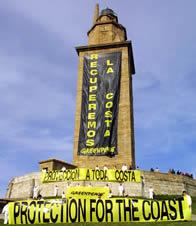|
|  |
Prestige: carcinogenic PAH in trophic chain
Nunca Mais - 12.11.2003 18:14
Today galician scientist from the University of A Corunha at Galiza where the Prestige Oil tanker sunk, has oficially presented a report demonstrating how both spanish and galician authorities was hiden to the people the real presence of Polycyclical Aromatic Hydrocarbons wich are well known carcinogenic compunds of the fuel-oil wich the Prestige was carrying.

Greenpece over the Hercules Tower at A Corunha, Galiza
According to the official reports 14.000 tons remains to be extracted from the sunken tanker. This means a total sum of 63.000 tons of fuel wich is still arriving to more than 1.000 kilometers of a extraordinary landscape, flora and fauna richness with a lot of very high value ecological places like natural reserves or protected spaces with species in extinction danger.
Every ton of this spill -clasified as number 2, 6 or M-100 by the french, russian or anglosaxon terminologies respectively- contains 350 grammes of a carcinogenic compound formed by heavy metals joined to poli-cyclical aromatic hidrocarbons (PAH). The very high PAH persistance in the trophic chain lies in its low vulnerability under bacterium action. The bioregeneration tecniques are not effective in this case because the bio-degradation potencial of this compound becomes only a 15%.
Cetaceans and seabirds was the first victims of the fuel-oil spill, wich also caused the death of the german hermit who lived in Camelhe. The estatistical estimations with the reference of the Exxon Valdez (Alaska,1984: 38.800 oil tons) calculates between 300.000 and 650.000 the number of death seabirds. This numbers can be a measure of the effects in the the very dense population of fish, crustacean an shellfish among others wich generates the 84% of the galician enterprises invoicing. More than 1.500.000 people, wich represents the 50% of the total galician population, lives in the coast depending of this economical activity.
Considering the very strong relationship of this population with the affected ecosystems and bearing in mind the low biodegradation potencial of this compound once inside the trophic chain, is neccesary to talk about the worst ecological dissaster in history because oil spills (five spills in the last ten years). Its effects will remain along the next years with seriously consecuences in human health.
The human health problem was cuestioned by ecologist all this year, but only now are evidences of its impact for the next years: this report, signed by Luis Fernández under the direction of the awarded Juan Freire at the journal  http://www.elmundo.es/, shows evidences of PAH presence more than admited by spanhish and galician authorities in the trophic chain. This affects that sea-populations wich are comercialized to all the world, specially in Europe. The only evidences that the local authorities shows to probe the well-state of that sea-products is... that no european authority has presented no appeal! But of course, affects all the coastline population who doesn't know nothing about PAH because it is not simply detectable, and of course will remain in the next years. Here http://www.elmundo.es/, shows evidences of PAH presence more than admited by spanhish and galician authorities in the trophic chain. This affects that sea-populations wich are comercialized to all the world, specially in Europe. The only evidences that the local authorities shows to probe the well-state of that sea-products is... that no european authority has presented no appeal! But of course, affects all the coastline population who doesn't know nothing about PAH because it is not simply detectable, and of course will remain in the next years. Here  http://www.nodo50.org/mareanegra/lires you can find photos http://www.nodo50.org/mareanegra/lires you can find photos  http://www.nodo50.org/mareanegra/lires/m/home.htm and videos http://www.nodo50.org/mareanegra/lires/m/home.htm and videos  http://www.nodo50.org/mareanegra/lires/videos.htm showing the presence of fuel-oil in stones and sand surfaces... at the end of september!! http://www.nodo50.org/mareanegra/lires/videos.htm showing the presence of fuel-oil in stones and sand surfaces... at the end of september!!
So under this evidences, we'd like to encourage you to ask your local health responsibles about the presence of carcinogenic PAH due their well known carcinogenic effects, and please tell us if you had found problems, because here our authorities just still says: 'no problem'.
Today also, we have received an action from Greenpeace volunteers, who covers the Hércules Tower of the city of A Corunha, wich is a symbol of the marine trafic all over those centurys in the most affected country by oil spills, where the 10% of the total world maritime trafic goes in front of, and near the 70% of the petroleum trafic of the European Union.
Please, try:
International Calling: Next Sunday 200311 16
NUNCA MÁIS at Santiago de Compostela
 http://galiza.indymedia.org/n1nk+/ http://galiza.indymedia.org/n1nk+/
 Website: http://galiza.indymedia.org Website: http://galiza.indymedia.org
|
| Lees meer over: natuur, dier en mens | | aanvullingen |  | |


